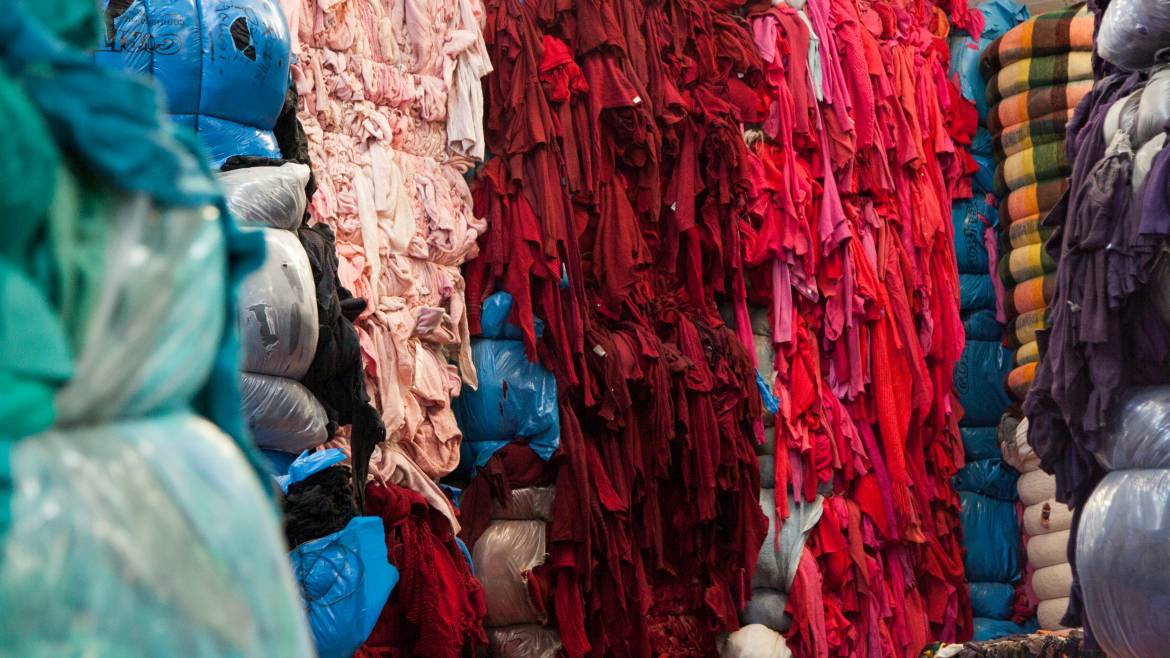The products supplied by the companies associated to ASTRI, which deal with second raw textile raw materials, are the result of a process of regeneration of pre-consumption textile by-products (fibrous material that comes from the process of dry and spring fraying, filandre, cimmose, cuttings of packaging, waste in general, etc.) and post-consumption (rags in general).
As per ordinary industrial practice according to the dictates of the Tullio Buzzi Industrial Technical Institute, these materials are obtained from a series of steps that can involve carbonization plants, fraying, washing, garnettature, beater etc. This happens in a VIRTUOSA logic that marries in full the sense of CIRCULAR ECONOMY underlined by the European Parliament, with decision of 20 April 2012, with the definition of the priorities for the seventh environmental action program. This seventh program sets targets for prevention, re-use and recycling, including the ban on incineration of waste that can be recycled or composted, with reference to the hierarchy provided for in the Waste Framework Directive (Article 4 of Directive C.E. 17/6/2008)
The high value of a textile raw material, like the one we are processing, helps to safeguard the planet’s natural resources, contributing to the reduction of water consumption, the savings in terms of kilowatt of energy and tons of chemical and coloring auxiliaries, with significant savings on carbon dioxide and sulfur dioxide emissions. All this, with the use of by-products that arise from work processes and used rags, helps to combat that Linear Economy that is very harmful for the whole COLLECTIVITY.
To use the words of Paul Connet Professor emeritus of Environmental Chemistry at the Saint Lawrence University of Canton, New York, and creator of the Zero Waste strategy:
THE WORLD IS INCOMING TO UNDERSTAND “THE DANGER OF THE INCINERATION AND THE BENEFITS OF THE ALTERNATIVE”.
THE WORLD IS STARTING TOWARDS THE ADHESION AND THE DIRECTION BY A LOT OF CITIES TO THE “ZERO WASTE PROTOCOL”. THE ENVIRONMENTAL MATERIAL WILL GIVE TO THE WORLD THE POSSIBILITY X THE CREATION OF WORKPLACES. THE RECYCLING OF DIGNITY OF A SALARY IN DIFFICULT TIMES OF THE ECONOMY. THE RECYCLING INDUSTRY INSTRUCTS AND ASSUMES MEN AND WOMEN IN ENVIRONMENTAL WORK, CREATING TEN TIMES IN MORE WORKING PLACES NECESSARY FOR THE DISPOSAL OF THE MATERIAL IN DUMPING “.
Since the company generally needs to shift attention from the final stage, that of disposal, at the initial stage, that of production and product, managing resources, it is inevitable and virtuous to keep alive an experience like that of Prato, rich in companies that deal with the transformation of these “potential waste” into excellent secondary textile raw materials that can replace virgin ones with a final result often of the highest level. All the Municipalities today are committed to increasing and refining the separate collection, with the transformation from textile by-products into fibrous material ready for the production of products such as carded yarns, carded fabrics and so on (about 142,500 tons transformed in Prato in the year 2017 ), we helped to make sense of the collection itself, which in the absence of a virtuous cycle like that of textile recycling would sin with incompleteness. This does not mean that proper attention is not required by the customer; above all in relation to the use to be made of the finished product. In fact, due to the type of material used, laboratory tests may give different results, both on the fibrous composition and on the ecotoxicity of the product itself. Any tests on the sample
THE WORLD IS STARTING TOWARDS THE ADHESION AND THE DIRECTION BY A LOT OF CITIES TO THE “ZERO WASTE PROTOCOL”. THE ENVIRONMENTAL MATERIAL WILL GIVE TO THE WORLD THE POSSIBILITY X THE CREATION OF WORKPLACES. THE RECYCLING OF DIGNITY OF A SALARY IN DIFFICULT TIMES OF THE ECONOMY. THE RECYCLING INDUSTRY INSTRUCTS AND ASSUMES MEN AND WOMEN IN ENVIRONMENTAL WORK, CREATING TEN TIMES IN MORE WORKING PLACES NECESSARY FOR THE DISPOSAL OF THE MATERIAL IN DUMPING “.
Since the company generally needs to shift attention from the final stage, that of disposal, at the initial stage, that of production and product, managing resources, it is inevitable and virtuous to keep alive an experience like that of Prato, rich in companies that deal with the transformation of these “potential waste” into excellent secondary textile raw materials that can replace virgin ones with a final result often of the highest level. All the Municipalities today are committed to increasing and refining the separate collection, with the transformation from textile by-products into fibrous material ready for the production of products such as carded yarns, carded fabrics and so on (about 142,500 tons transformed in Prato in the year 2017 ), we helped to make sense of the collection itself, which in the absence of a virtuous cycle like that of textile recycling would sin with incompleteness. This does not mean that proper attention is not required by the customer; above all in relation to the use to be made of the finished product. In fact, due to the type of material used, laboratory tests may give different results, both on the fibrous composition and on the ecotoxicity of the product itself. Any tests on the sample



